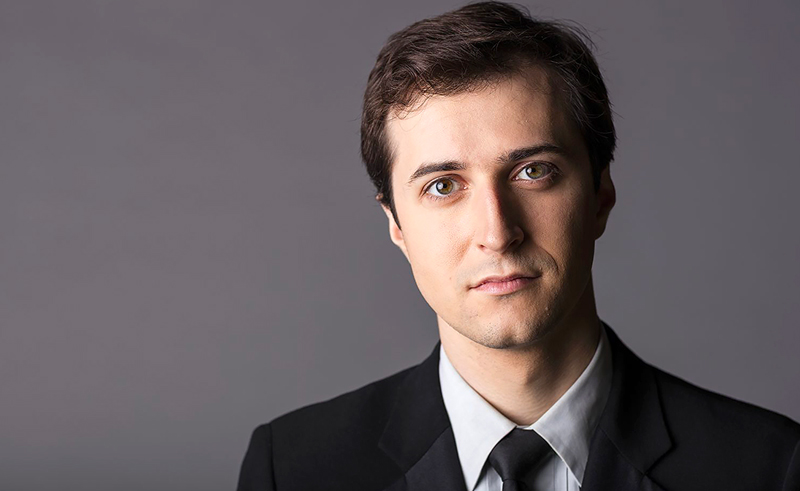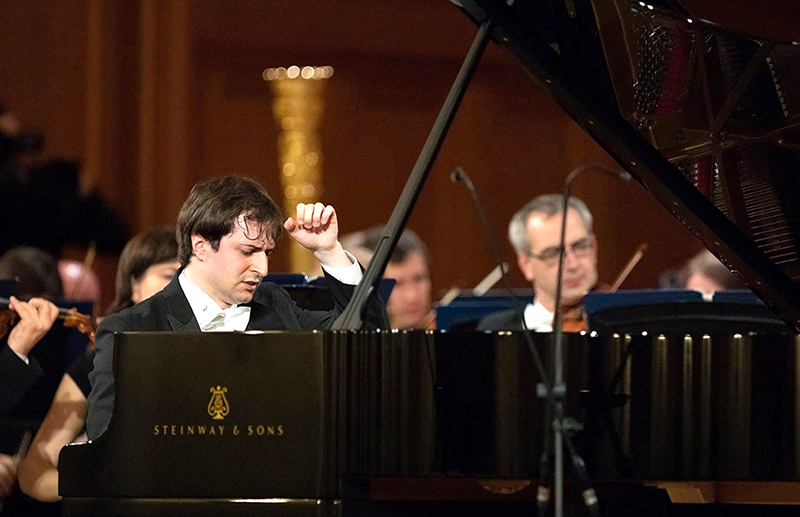
Twenty years—almost to the day—after his teacher Stanislav Ioudenitch, founder and artistic director of the International Center for Music at Park University, won the gold medal at the Van Cliburn International Piano Competition, Kenny Broberg took top honors at the American Pianists Awards Competition in Indianapolis in June.
Broberg, 27, hails from Minneapolis. Before coming to Park University four years ago to study with Ioudenitch, he earned a bachelor of music degree at University of Houston Moores School of Music.
Broberg was already one of the most highly decorated pianists in the world under age 30, having won the silver medal at the Van Cliburn competition in 2017 and the bronze medal at the International Tchaikovsky Competition in 2019.
His triumph at the American Pianists Awards comes with a $50,000 cash award, a recording contract with the Steinway and Sons record label, and an artist-in-residence post at University of Indianapolis.
Broberg is known for his extraordinary technical skills, clarity, and precision. His playing style has been lauded for its agility, finesse, and great sensitivity to dynamics. Broberg spoke with IN Kansas City by phone a few days after his win about how his life is about to change and shared an inside perspective of the world of competitive classical piano.
Where are you calling me from?
I’m back here in Kansas City.
Do you wake up every morning and remember all over again that you won?
I think it hasn’t really sunk in yet. But I think eventually it will be something I will remember pretty well.
You were born and raised in Minneapolis. What was your neighborhood like?
It was a nice neighborhood until [laughs], well, I actually lived right near where all the protests were.
Was that traumatic for you this summer?
I was following it extremely closely, I was very worried.
What was it like growing up there?
There are so many lakes there, in the summer you just go [to the water]. It’s like there’s a lake every hundred feet. [Laughs]
What kind of a kid were you?
I was a weirdo.
How so?
Because I wanted to play piano all the time. My dad was trying to get me to go outside and play in the street, and all I wanted to do was play piano.
How old were you when you started taking lessons?
Six years old.
When you first started, did you actually enjoy practicing?
I enjoyed making music. For sure.
At what point did you decide you would like to become a musician as a profession?
I’m pretty lucky because I’ve always known what I wanted to do, and I haven’t had many moments where I thought otherwise.
What was it like in school, knowing you were interested in a different path than most kids?
I was homeschooled until high school, and then I went to a public high school.
Did your teachers understand your focus on music as a career choice?
I think that maybe one or two did and the rest absolutely not.
What did your parents think?
They’ve always been supportive of me.
How is life in Parkville different than living in Minneapolis?
Honestly, of course it’s different, but I’ve kind of lived my whole life in the Midwest: Minneapolis, Houston, and now Kansas City. So, there’s a certain comfort factor. You know, people aren’t too fast-paced around here. I like the Midwestern niceness. I travel a lot for concerts, and I travel to a lot of big cities, and so it’s nice to be able to come back and work in kind of a quiet, little place.
Do you have any places that are favorite hangouts in Parkville?
I go to Parkville Coffee in downtown Parkville four or five times a week.
Is winning this competition going to radically change your life?
I don’t think the change will be that abrupt. After I did the [Van] Cliburn [International Piano] competition, that significantly changed the way I live.
How?
Four years ago when I did the Cliburn competition, I was playing at the level of a professional. But I wasn’t playing concerts. I was living as a student. So, after Cliburn I went from playing no concerts to playing a lot of concerts, like 60 or 70 [per year].

The whole idea of competitive classical piano, to me, seems odd.
Oh, it is odd! You could not be more right. It’s anti-musical.
I don’t want to come off sounding anti-competition or ungrateful, because competition has really helped me in my career. But there absolutely is that element to it because it is a subjective thing. And if you’re not careful, it does not cultivate a good mindset. Because this is not what music is about. Music is about connecting us, not trying to single people out. And so often it becomes so much more about getting all the right notes in and playing in a way where judges can’t deduct anything because you didn’t do anything quote-unquote wrong.
So the playing could become kind of defensive?
I feel like students in major conservatories are afraid to do anything or take any risks. And that robs you of the absolute most important thing, which is individuality.
Why did you choose to go down the competition path?
There are many different roads to go where I want to go, but none of them are very clear. There isn’t really a blueprint for how you make a career as a concert pianist. This is one good way to create exposure. And I’m very grateful to all these competitions. I decided to go that route because it’s the most clear-cut path. Winning gives you confidence.
Now that you’ve won this major competition do you feel that you can step out of competitive piano?
Yes. I can retire from the competitions.
Is that exciting?
Oh, yeah. I’ve been wanting to do that since the first one I did. [Laughs]
Do you feel that you have picked up any habits because of competitions that you need to unlearn?
No. I think competitions gave me good habits.
“Discipline. You have to practice, because there’s no other way to do it. I practice probably six hours a day with the most intense concentration that I possibly can.”
Like what?
Discipline. You have to practice, because there’s no other way to do it. I practice probably six hours a day with the most intense concentration that I possibly can.
Do you expect now to see a change in your music when you are freed from the constraints of what notes the judges want to hear, or how they think Bach ought to be played?
Bach is a very particular case with that. [Laughs] I remember one time Stanislav [Ioudenitch] was telling me, “If anyone tells you that Bach should only be played a certain way, you throw up on them!”
Because with Bach, we don’t play it—or I don’t play it—on the instrument that he wrote it for. So we’re already playing a transcription of it. We have much less information about him than about a lot of composers, about performance practices of his time. So we kind of recreate our own way of playing Bach, and anybody that thinks they know exactly how Bach would have played it—ahhh, I don’t think that they do.
When you’re by yourself at the piano, do you ever play any other styles of music besides classical? For example, could you play jazz piano, and do you have any desire to?
I love jazz, and actually I listen to it pretty frequently. But I think it’s a completely different mindset from classical piano.
There are a lot of classical pianists that [laughs] claim to play jazz, and very few of them really do it the way jazz players do. That’s because, with classical musicians, we’re all about recreating what’s already written on the score. We’re trying to faithfully reproduce the music that somebody else wrote. Jazz is kind of planned improv, so there’s a level of spontaneity and a level of quick thinking that really astonishes me.
What is the thing you are looking the most forward to now that you don’t have to play competitions anymore?
Getting back to being able to just play concerts. This was very good timing, because after a year and a half of not playing concerts because of Covid, presenters are still very wary of organizing events, so things are moving in the right direction, but they are still moving pretty slowly. So this is the right place and the right time for me to resurrect where I was headed before things shut down.
What is it that you love so much about playing concerts?
It’s a kind of validation. I spend so much time working on what I do, and it’s not worth doing if you can’t share it with other people.
Interview condensed and minimally edited for clarity.


